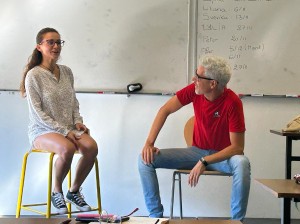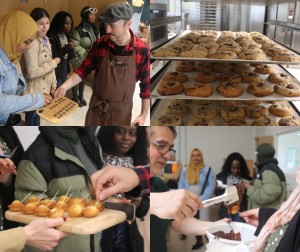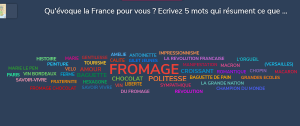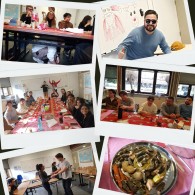How do we work?
All the levels
All courses follow the CEFR (Common European Framework of Reference for Languages) levels from A0 to C2.
After an individual written and oral placement test, students are divided into groups consisting of a maximum of 18 students.
Our approach
- The teaching style is predominantly based on a communicative approach and an action-oriented focus: there are many interactions in and out of class such as informal discussions, oral presentations, press reviews and short dissertation presentations.
- Students are also offered individual or collaborative projects so that they can reinvest what they have learnt outside the classroom.
French courses
The activities offered are based on excerpts from textbooks or on documents created by teachers, with a preference for authentic documents: these include excerpts from newspaper articles, videos, radio, literary texts, the press – national, French-speaking or local –, blogs, advertisements, songs, posters, excerpts from films, TV series, clips, short films and trailers.
More specialised courses
- The higher the CEFR level, the more students benefit from specific courses with specialised discourse.
- These are the Cultural Knowledge and/or Disciplinary courses: literature, cinema, history and geography, French songs, art history, French for University Purposes, etc.
Projects, outings and other activities
- Over the course of each half-year, each group organises educational or cultural outings that propose projects and/or cultural field trips. Some groups went to taste local produce at Les Halles, others discovered the Emmaüs village in Lescar, while working on recycling. Some groups visited the Basque village of Espelette or the Guédot farm in Rébénacq.
- Projects are regularly organised with the Musée de la Résistance in Pau.
Our students also take part in activities that allow them to practise their French outside the classroom: during Talent Week, our students organise workshops for other students on music, sewing, dance and games in French.
The students also take part in the Printemps des Poètes festival with members of the Université du Temps Libre Aquitaine (UTLA), or the Cordées de la réussite with secondary school pupils, or the monthly Café Mundus at Aquiu.
- At the end of each session, an international meal is organised in each group to discover the culinary specialities of each country. Conviviality is very important in creating an atmosphere conducive to learning.



